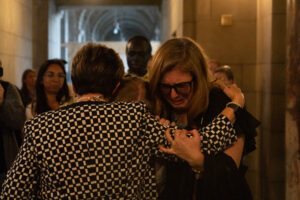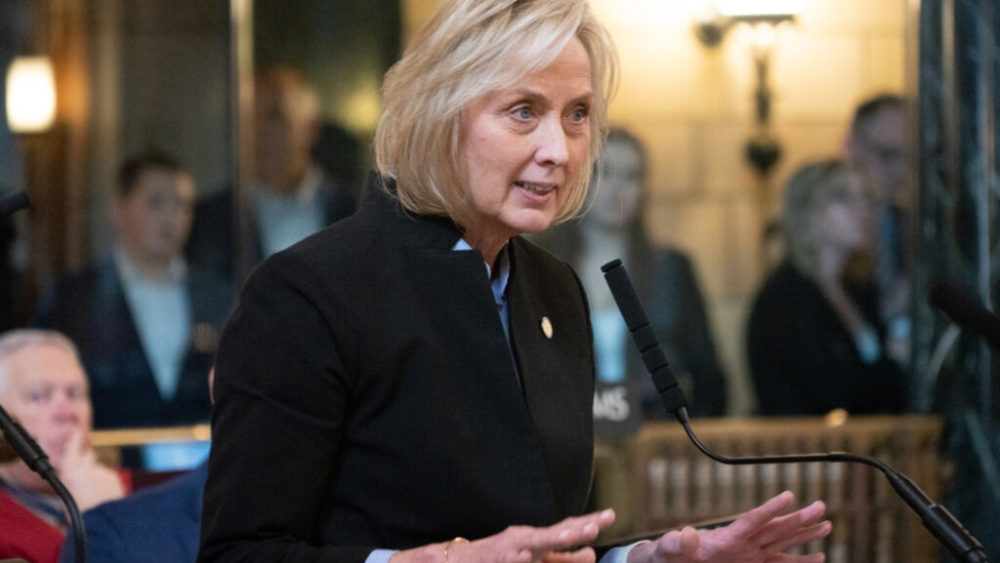
Photo / Zach Wendling, Nebraska Examiner
State Senators Megan Hunt and Machaela Cavanaugh, both of Omaha, hug former State Sen. Patty Pansing Brooks after the vote on LB 574 on Tuesday in Lincoln.
Aaron Sanderford and Zach Wendling
Nebraska Examiner
LINCOLN — With thousands of Nebraskans watching, including hundreds in person, state lawmakers shoehorned a stricter abortion ban into an already divisive bill to limit gender-affirming care for minors. The proposal is now one step from passage.
Tuesday’s action was the culmination of months of public outcry and legislative fights over the two measures, both of which nearly failed as free-standing bills. But once the bills were tweaked and combined, backers gained the critical 33rd vote needed to overcome three months of filibustering.
Senators made the rare decision to pull back Legislative Bill 574 on final reading and amend it with changes to the gender-affirming care bill and a more restrictive abortion ban than the 20 weeks from fertilization that is in current state law.
Gov. Jim Pillen, who personally pressed to revive the abortion ban, applauded senators for supporting LB 574 and its “commonsense, conservative values.”Nebraska is one of many red states that have pursued stricter abortion bans and limits on gender-affirming care since Roe v. Wade was overturned.
‘One more vote to save our lives’
An emboldened conservative majority combined the proposals in a 33-15 vote while more than 350 people, many of them opposed to both measures, chanted loudly enough from the Rotunda to be heard on the legislative floor. As the bill cleared a key hurdle, opponents watching the debate from the gallery erupted.
“One more vote to save our lives! You can’t debate on human rights,” the crowd chanted, which prompted Lt. Gov. Joe Kelly, the president of the Legislature, to clear both galleries. This was the second time this session he had done so.
State Sen. Megan Hunt of Omaha, whose son is transgender, began crying when she heard the chants from the Rotunda and said her colleagues needed to listen to the crowd. She said calls to suicide hotlines had spiked because of the Legislature’s debates over the gender-affirming care measure.
“You can have at least as much courage as the trans kids and their families out in the Rotunda who have to live every day, who have to go to school, and who by the grace of God get the courage to come here to their state Legislature and say it to you,” Hunt said.
State Sen. Kathleen Kauth, the sponsor of LB 574, said she agreed with the sentiment of the chants, but for a different reason.
“We have one vote to save the lives of children from a lifetime of pain and regret,” Kauth said.
What the bill does
Kauth’s bill would restrict what gender-affirming care minors could receive, including puberty blockers, hormone therapies and genital or non-genital surgeries. People already receiving care by Oct. 1 would be allowed to complete their treatments. No surgeries would be allowed for anyone under 19.
Tuesday’s changes would allow the state’s chief medical officer to prescribe rules and regulations that could allow the medications. Opponents worry that delegating this authority to a gubernatorial appointee would risk a back-door ban on the medications. Supporters described the change as a compromise.
State Sen. John Cavanaugh of Omaha filed an amendment that would list specific restrictions on blockers and hormones rather than delegate the decision to the chief medical officer. It’s unlikely to be adopted, but could be debated during the final reading of the bill.
LB 574 as amended would ban abortions at 12 weeks gestational age, from the first day of a mother’s last period. The bill contains exceptions for the life of the mother, rape and incest but does not offer exceptions for fetal anomalies, including for conditions incompatible with life.
‘Procedural war’
One of the only chances for opponents to stop LB 574 was to block the amendment that combined the issues, forcing a vote on the bill as-is. Multiple senators had said they might not support the bill without the changes.
Rules changes this session that were intended to weaken the filibuster came into play Tuesday for one of the first times, limiting the number of motions that opponents could use to slow things down. Opponents had hoped to use up the allotted two hours of debate and kill the bill.
Once their major motion failed, opponents tried to use points of order and attempts to overrule several decisions by Kelly, the Legislature’s presiding officer.
What was originally scheduled as a two-hour debate stretched over five hours, as Speaker John Arch of La Vista flexed his ability to press pause on the clock during motions against Kelly.
Those motions were handled differently Tuesday than they were during even the first round of debate on LB 574, where two hours of such motions were counted toward the eight hours of debate.
State Sen. Ben Hansen of Blair, who introduced the amendment combining the two issues, said he didn’t blame opponents for working to block his amendment by running out the clock. He said conservatives were working to make sure his amendment was heard.
“This is a bill they are very passionate about, and that they don’t like, and they were trying to stop it,” Hansen said. “What you saw was a procedural war, kind of a battlefield of ideas here on the floor. … It’s just that the rules worked out in our favor — that’s just how good government is supposed to work.”
‘Blood on your hands’
State Sen. Machaela Cavanaugh, as it became clear that the bill would have enough support to be amended, accused the legislative majority of cheating and changing the rules to win.
“Women will die,” she said. “Children are dying. It is your fault. … You do literally have blood on your hands, and if you vote for this, you will have buckets and buckets of blood on your hands.”
Last month, Montana lawmakers disciplined Democratic state Rep. Zooey Zephyr, who is transgender, for making similar comments. In Nebraska, Cavanaugh faced a threat of censure in March for comments about LB 574 and its potential impact on trans youth. Her words Tuesday prompted no immediate reaction.
Majority rules
State Sen. Steve Erdman of Bayard, chairman of the Legislature’s Rules Committee, said the rules are ultimately what 25 senators want them to be. He and others said the majority weren’t the only ones to use rules to their advantage this session.
State Sen. Justin Wayne of Omaha agreed with Erdman about who decides the rules but said the Legislature had until recently prided itself on acting differently toward senators in the minority.
He said the inconsistent ways the rules were applied risks leaving future Legislatures with the majority deciding on its own how the rules are applied.
“Today is not a good day for Nebraska,” Wayne said. “What happened here today is win at all costs instead of doing what’s best for all Nebraskans.”
Riepe’s deal
The amendment secured the support of four senators who had criticized parts of the proposals during previous rounds of debate: State Sens. Merv Riepe of Ralston, Tom Brandt of Plymouth, Jana Hughes of Seward and Myron Dorn of Adams.
Riepe provided the 33rd vote needed to overcome a filibuster. Nearly three weeks ago, he refused to vote for LB 626, which contained a ban timed to embryonic cardiac activity, which occurs about six weeks into a pregnancy. He said at the time it didn’t give women enough time to act. He kept his deal with legislative conservatives Tuesday to support a less restrictive ban. The LB 574 amendment he agreed to would cut off abortions about two weeks sooner than his previously proposed amendment.
He and Hansen said they would work together next year on trying to add clarifying language that puts to rest any concerns about potential criminal penalties for doctors performing abortions in Nebraska. Riepe also wants to add a risk assessment next year for suicidal pregnant women.
“I want to sweeten this thing, polish it up, make it more workable, make it more reasonable,” he said. “I think it was pretty explosive to put two controversial bills together. It’s like nitroglycerin and something else. It’s unfortunate.”
Hunt said Riepe would be “on an island by yourself” in adding clarifying language on criminal penalties. Machaela Cavanaugh accused Hansen of lying to get Riepe’s support.
Seeding legal challenges
John Cavanaugh and others again suggested that the amendment put doctors at risk of being prosecuted. State Sen. Carolyn Bosn of Lincoln, a former Lancaster County prosecutor, said Riepe and others didn’t need to worry about criminal penalties in the bill because there are none. State Sen. Teresa Ibach of Sumner said that the amendment wasn’t perfect but that senators shouldn’t let perfect be the enemy of good.
Opponents pledged to fight the bill during its final two-hour debate, which could come as early as Thursday, and in court, if necessary. Demonstrators against LB 574 said they would keep up their protests. Supporters of the bill had demonstrated as well. Arch said he had not yet scheduled the bill’s next debate.
Several senators laid groundwork during Tuesday’s debate for likely legal challenges, whether on the State Constitution’s requirement that each bill cover only a single subject, or on the 14th Amendment, which promises “equal protection of the laws.” Bans on gender-affirming care are currently being challenged in nine states.
State Sen. Danielle Conrad of Lincoln, who had served two terms in the Legislature and was term-limited before being elected to a third term, said she was sad to see the officially nonpartisan Legislature succumb to the tone and tenor of national partisan politics.
“I think today was a very sad day where you saw citizens crying out for autonomy and dignity, and you saw the majority bend the rules, if not break the rules, at every turn in order to achieve a desired result,” she said.
Hunt said that would be the legacy of the 2023 legislative session.







